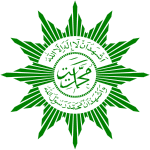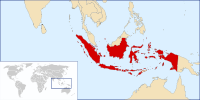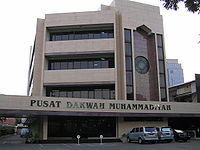- Muhammadiyah
-
Muhammadiyah 
The logo of Muhammadiyah
Zone of influenceFormation 18 November 1912 Type Organization Purpose/focus Religious islamic Headquarters Jakarta, Indonesia Region served Indonesia Membership 29 Millions Leader Prof. Dr. HM Din Syamsuddin Website Official website Muhammadiyah (full name: Persyarikatan Muhammadiyah) is an Islamic organization in Indonesia. Muhammadiyah, literally means "followers of Muhammad" (from Arabic). The organization was founded in 1912 by Ahmad Dahlan in the city of Yogyakarta as a reformist socioreligious movement, advocating ijtihad - individual interpretation of Qur'an and sunnah, as opposed to taqlid - the acceptance of the traditional interpretations propounded by the ulama.[1]
At the moment, Muhammadiyah is the second largest Islamic organization in Indonesia with 29 million members.[1] Although Muhammadiyah leaders and members are often actively involved in shaping the politics in Indonesia, Muhammadiyah is not a political party. It has devoted itself to social and educational activities.
Contents
History
On November 18, 1912, Ahmad Dahlan— a court official of the kraton of Yogyakarta[2] and an educated Muslim scholar from Mecca—established Muhammadiyah in Yogyakarta. There were a number of motives behind the establishment of this movement. Among the important ones are the backwardness of Muslim society and the penetration of Christianity. Ahmad Dahlan, much influenced by Egyptian reformist Muhammad 'Abduh, considered modernization and purification of religion from syncretic practices were very vital in reforming this religion. Therefore, since its beginning Muhammadiyah has been very concerned with maintaining tawhid, and refining monotheism in society.
From 1913 to 1918, Muhammadiyah established five Islamic Schools. In 1919 an Islamic high school, Hooge School Muhammadiyah was established.[3] In establishing schools, Muhammadiyah received significant help from the Boedi Oetomo, an important nationalist movement in Indonesia in the first half of the twentieth century, such as in the form of providing teachers.[4] Muhammadiyah has generally avoided politics. Unlike its traditionalist counterpart, the Nahdatul Ulama, it never formed a political party. Since its establishment, it has devoted itself to educational and social activities.
In 1925, two years after the death of Dahlan, Muhammadiyah only has 4,000 members, even has built 55 schools and two clinics in Surabaya and Yogyakarta.[5] After Abdul Karim Amrullah introduced the organisation to Minangkabau dynamic Moslem community, Muhammadiyah developed rapidly. In 1938, organisation claimed has 250,000 members, managed the 834 moques, 31 libraries, 1,774 schools, and 7,630 ulema. The Minangkabau Merchants spread organization to the entire of Indonesia.[6]
During the 1965-66 political turbulence and violence, Muhammadiyah declared the extermination of the "Gestapu/PKI" (the 30 September Movement and the Indonesian Communist Party) constituted Holy War, a view endorsed by other Islamic groups.[7] (see also: Indonesian killings of 1965-66). During the 1998 "Indonesian reformation", some parts of Muhammadiyah urged the leadership to form a party. Therefore, they - including Muhammadiyah chairman, Amien Rais, founded the National Mandate Party. Although gaining large support from Muhammadiyah members, this party has no official relationship with Muhammadiyah. The leader of Muhammadiyah says the members of his organisation are free to align themselves with political parties of their choosing provided such parties have shared values with Muhammadiyah.[8]
Today, with 29 million members Muhammadiyah is the second largest Muslim organization in Indonesia, after Nahdatul Ulama.
Doctrine
The central doctrine of Muhammadiyah is Sunni Islam. However, the main focus of the Muhammadiyah movement is to heighten people's sense of moral responsibility, purifying their faith to true Islam. It emphasizes the authority of the Qur'an and the Hadiths as supreme Islamic law that serves as the legitimate basis of the interpretation of religious belief and practices, in contrast to traditional practices where shariah law invested in religious school by ulema.
Muhammadiyah strongly opposes syncretism, where Islam in Indonesia has coalesced with animism (spirit worship) and with Hindu-Buddhist values that were spread among the villagers, including the upper classes, from the pre-Islamic period. Furthermore, Muhammadiyah opposes the tradition of Sufism that allows Sufi leader (shaykh) as the formal authority of Muslims.
As of 2006, it is said to have "veered sharply toward a more conservative brand of Islam" under the "leadership of Din Syamsuddin" the head of the Indonesian Ulema Council. [9]
Activities
 Muhammadiyah head office in Jakarta
Muhammadiyah head office in Jakarta
Muhammadiyah is noted as a Muslim reformists organization. Its main activities are religion and education. It has built Islamic schools in modern forms, aside from traditional pesantren. Some of its schools are also open to non-Muslims.[10] Currently there are around 5,754 schools owned by Muhammadiyah.[11]
It has also functioned as a charitable organization. Today it owns several hundred medical clinics and hospitals in Indonesia. Recently it has been active in campaigning about the danger of bird flu in Indonesia.[12]
Organization
The national headquarters was originally in Yogyakarta. However, by 1970 the committees dealing with education, economics, health and social welfare had been relocated to the national capital, Jakarta.
Muhammadiyah is supported by several autonomous organizations:[13]
- Aisyiyah ( Women )
- Pemuda Muhammadiyah ( Youth )
- Nasyiatul Aisyiyah ( Young Women ) (http://nasyiah.or.id)
- Ikatan Remaja Muhammadiyah ( a teenagers group) [1]
- Tapak Suci Putra Muhammadiyah (Pencak Silat)
- Hisbul Wathan ( Scouting ).
The central committee structure consists of five advisors, a chairman, a vice chairman, a secretary general and some deputies, a treasurer and some deputies, as well as several deputies of chairman.[14]List of Leaders
- KH Ahmad Dahlan 1912-1922
- KH Ibrahim 1923-1934
- KH Hisyam 1935 - 1936
- KH Mas Mansur 1937 - 1941
- Ki Bagus Hadikusuma 1942 - 1953
- Buya A.R Sutan Mansur 1956
- H.M. Yunus Anis 1959
- KH. Ahmad Badawi 1962 - 1965
- KH. Faqih Usman 1968
- KH. AR Fachruddin 1971 - 1985
- KHA. Azhar Basyir, M.A. 1990 - 1995
- Prof. Dr. H. M. Amien Rais 1995 - 1998
- Prof. Dr. H. Ahmad Syafi'i Maarif 1998 - 2005
- Prof. Dr. HM Din Syamsuddin 2005 -
Muhammadiyah University
Muhammadiyah organisation has a number of universities which are spread out in several provinces of Indonesia, such as:
- Muhammadiyah University of Malang [3]
- Muhammadiyah University of Yogyakarta [4]
- Muhammadiyah University of Surakarta [5]
- Muhammadiyah University of Purwokerto [6]
- Muhammadiyah University of Makassar [7] Unismuh
- Muhammadiyah University of Magelang [8] UMMGL
- Muhammadiyah University of Semarang
- Muhammadiyah University of Metro, Indonesia
- Muhammadiyah University of Palembang
- Muhammadiyah University of Bengkulu
- Muhammadiyah University of West Sumatra
- Muhammadiyah University of North Sumatra
- Muhammadiyah University of Aceh
- Muhammadiyah University of Cirebon
- Muhammadiyah University of Bekasi
- Muhammadiyah University of Purworejo
- Muhammadiyah University of Surabaya
- Muhammadiyah University of Sidoarjo
- Muhammadiyah University of Gresik
- Muhammadiyah University of Jember
- Muhammadiyah University of Kupang
- Muhammadiyah University of Ternate
- Muhammadiyah University of Gorontalo
- Muhammadiyah University of Jakarta
- Muhammadiyah University of Prof. Dr. HAMKA
- Ahmad Dahlan University of Yogyakarta
See also
- Nahdatul Ulama
- Islam in Indonesia
References
- Burhani, Ahmad Najib. 2005. "Revealing the Neglected Missions: Some Comments on the Javanese Elements of Muhammadiyah Reformism." Studia Islamika, 12 (1): 101-129.
- Burhani, Ahmad Najib. 2010. Muhammadiyah Jawa. Jakarta: Al-Wasat.
- Peacock, J.L. (1978). Purifying the Faith: The Muhammadijah Movement in Indonesian Islam. Cummings Press.
- "Muhammadiyah". Div. of Religion and Philosophy, St. Martin College, UK. http://philtar.ucsm.ac.uk/encyclopedia/indon/muham.html. Retrieved 2006-08-28.
- Ricklefs, M.C. 1991. A History of Modern Indonesia since c.1300. 2nd Edition, Stanford: Stanford University Press. ISBN 0-333-57690-X
Notes
- ^ a b "Muhammadiyah". Div. of Religion and Philosophy, St. Martin College, UK. http://philtar.ucsm.ac.uk/encyclopedia/indon/muham.html. Retrieved 2008-08-28.
- ^ Burhani (2005), p. 101.
- ^ "Short History of Persyarikatan Muhammadiyah". Muhammadiyah. http://www.muhammadiyah.or.id/index.php?option=com_content&task=view&id=22&Itemid=35. Retrieved 2006-08-10.[dead link]
- ^ Burhani (2010), pp. 65-66
- ^ Ricklefs, M.C. (1991). A History of Modern Indonesia 1200-2004. London: MacMillan. p. 356.
- ^ Ricklefs, M.C. (1991). A History of Modern Indonesia 1200-2004. London: MacMillan. p. 357.
- ^ Ricklefs (1991), p. 288.
- ^ "Muhammadiyah Makes Overtures to Islamists". Indonesia Matters. http://www.indonesiamatters.com/386/muhammadiyah-makes-overtures-to-islamists/. Retrieved 2006-08-10.
- ^ In Indonesia, Islam loves democracy
- ^ "USINDO Roundtable With the Muhammadiyah and Aisyiyah Delegation". The US-Indonesian Society. http://www.usindo.org/Briefs/2006/Muhammadiyah%20on%20Health%2004-06-06.htm. Retrieved 2006-08-10.[dead link]
- ^ "Muhammadiyah urged Governot to Set Model School". Tribun Timur. http://www.tribun-timur.com/view.php?id=30329&jenis=Kota. Retrieved 2006-08-10.[dead link]
- ^ "Muhammadiyah to help campaign on danger of avian flu". Antara. http://www.antara.co.id/en/seenws/?id=13950. Retrieved 2006-08-10.
- ^ "Autonomous Organizations". Muhammadiyah. http://www.muhammadiyah.or.id/index.php?option=com_content&task=view&id=40&Itemid=31. Retrieved 2006-08-10.[dead link]
- ^ "Central Organization". Muhammadiyah. http://www.muhammadiyah.or.id/index.php?option=com_content&task=view&id=63&Itemid=27. Retrieved 2006-08-10.[dead link]
External links
- Official website
- Official magazine
- Pacific Affairs, Vol. 27, No. 3 (Sep., 1954), pp. 255-263 Modern Islam in Indonesia: The Muhammadiyah After Independence
Categories:- Religious organizations established in 1912
- Organizations based in Indonesia
- Indonesian National Awakening
- Islam in Indonesia
Wikimedia Foundation. 2010.
